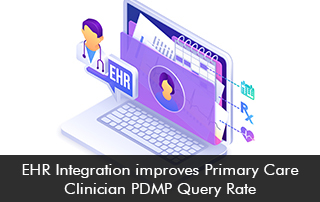A Prescription Drug Monitoring Program (PDMP) is an electronic database that efficiently records prescriptions for controlled substances. PDMPs aims to enhance the way controlled substances and opioids are prescribed, which helps reduce the number of patients who misuse and abuse drugs.
EHR integration of a PDMP
Electronic Health Records integration of a Prescription Drug Monitoring Program increases primary care clinician adherence to suggested prescribing practices for controlled substances according to a study published in JAMA Health Forum.
Researchers arranged an intervention that seamlessly integrates the PDMP into the EHR Software. The intervention reduced the trouble of querying the PDMP in the following two ways,
- Removes the need for a primary care physician to log into a separate web portal, streamlining access to the Prescription Drug Monitoring Program.
- Lowers the attention cost of remembering to query the PDMP.
The monthly PDMP query rates for the average physician were 6.6 vs. 8.8 queries in the PDMP integration groups. PDMP query rates during the intervention for the average clinician were 6.8 vs. 14.8 in the control and PDMP groups. The researchers found out that the impact of the intervention was more substantial for lesser experienced physicians.
Limitations of the study
The study conducted had limitations due to limited geographical range as the findings were centered on a single healthcare delivery system. The researchers however recognized that the system with its affiliates included urban, suburban, and rural areas so the results can be comprehensive.
PDMP and EHR Software integration
PDMP and Electronic Medical Records (EMR) Software integration has become common in recent years. Allowing healthcare providers to query state databases supports clinicians in better understanding the controlled substance utilization habits of their patients.
Patient care and Prescription Drug Monitoring Program
PDMPS offers clinicians patient information round the clock, this can help clinicians offer high-quality care to patients. Prescription Drug Monitoring Programs provide healthcare teams with valuable patient insights related to patient interactions with controlled substances. By knowing past interactions and risk factors related to the future clinicians can provide high-quality care enhancing patient safety.







